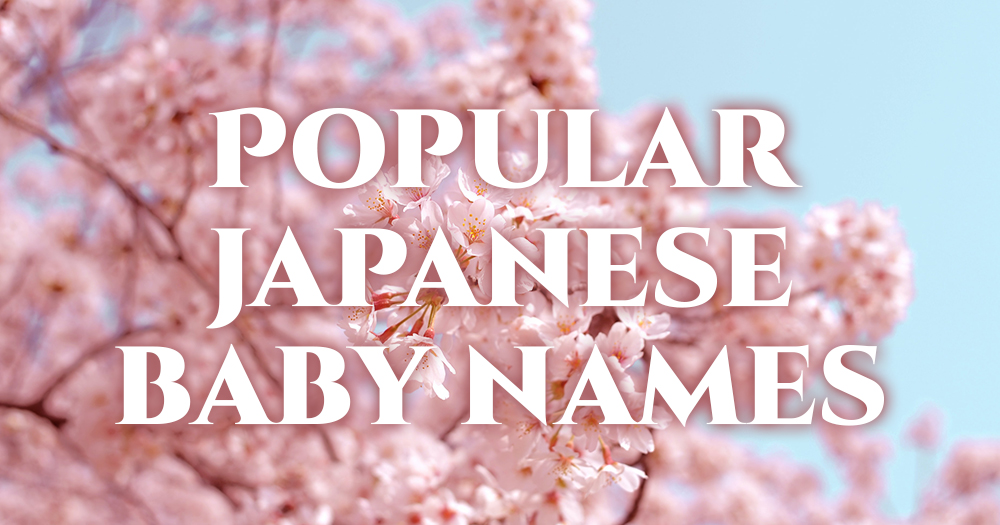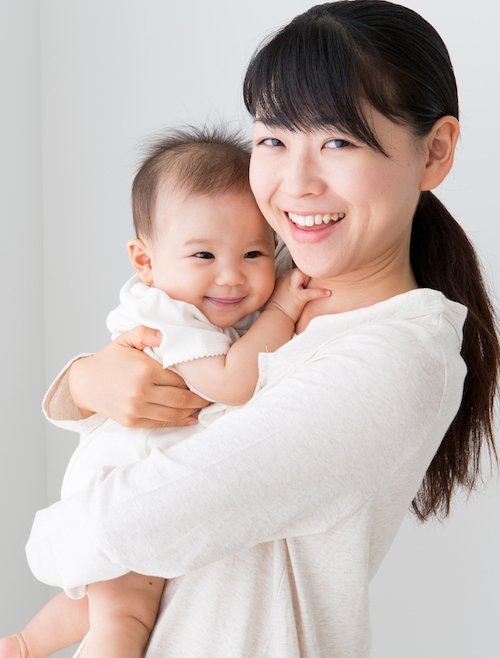
Japan has some of the most lovely sounding baby names in the world, and the most interesting historical naming conventions. The meanings of names in Japan varies depending on the kanji, or characters, associated with the sound of the name. The same sounding name can have multiple meanings, some of which are vastly different. For example, the popular name Aiko has three common sets of kanji characters: 愛幸, a combination of love and fortune. Yet, the kanji 愛子is a combination of love and child. Note how the first character is the same and the second character is what sets the difference. There is even 葵子, which means Hollyhock and child. Note the second character in the last two names mentioned – that is the kanji for child.
In Japanese baby naming, parents often put two meanings together and create a new meaning. This naming convention is also popular in English speaking cultures: creating new meanings based on a combination of names. For instance, Marylou means bitter (Mary) and famed warrior (Lou). Put them together and you have a bitter, well-known warrior. I find this particularly interesting because when I think of the name Marylou, I don’t think of a warrior but instead of someone’s sweet grandma. However, this is a pretty cool feature of names because if you have a feisty grandma, Marylou is a great name for her.
There is a visual component to Japanese baby names that we don’t use in the West. Looking at the names mentioned above, 葵子 might seem more aesthetically pleasing visually than 愛幸. Yet, in English speaking cultures, it’s rare that we look at the visual of Mallory or Jennifer and think one is more beautiful than the other. Instead, we look at the meanings of the names Mallory (unlucky) and Jennifer (white wave) and one is definitely more appealing.
So let’s take a deep dive into some of the most popular Japanese names according to research by Tamahiyo, a Japanese brand that focuses on pregnancy and childrearing. They took the names most popular of their users from January 1st to September 28th in 2021 and created the following most popular Japanese baby name list. Since many Japanese names could have multiple meanings based on the characters, we will be simplifying the meanings into the most common westernized definitions.
Japanese Girl Names
- Himari and Tsumugi tied for first place. Himari means “sun” and Tsumugi is handspun yarn from damaged cocoons.
- Rin: “companion”
- Mei “a dance”
- Aoi “hollyhock”
- Hina “greenery”
- Mio “heart/sun”
- Riko “jasmine/truth”
- Yuina “tie/bind”
- An “apricot”
Japanese Boy Names
- Ren: “lotus”
- Haruto “fly/sunlight”
- Aoi “bluish”
- Itsuki “tree”
- Minato: “harbor”
- Asahi: “morning sunlight”
- Ao: “vivid color”
- Hiroto: “big flight”
- Ritsu: “law”
- Dan: “sandalwood tree”
Interesting features of these popular Japanese baby names is that nearly half of these names are related to nature. Two male names are related to flight (Hiroto/Haruto) and one female name (Mio) and one male name (Asahi) are related to the sun. Although we are not showing the kanji for these names, all names had either one or two characters, with the majority of boy names having one character. Girl names were split: 5 had one character and 5 had two characters.
Another name list, this one from Nippon.com and features a list from 2020, include popular kanji baby names as well as the reading baby names. These are:
Popular Kanji Japanese Boy Names:
Ren, Haruto, Minato, Yuma, So, Itsuki, Hiroto, Yamato, Minato, Aoi
Popular Reading Japanese Boy Names:
Haruto, Minato, Haruki, Sota, Yuto, Riku, Yuito, Aoto, Aoi, Hinata
Popular Kanji Japanese Girl Names:
Himari, Mei, Hina, Yua, Yuna, Sakura, Akari, Aoi, Tsumugi, Riko
Popular Reading Japanese Girl Names:
Honoka, Akari, Himari, Mei, Ema, Yui, Mio, Ichika, Aoi, Tsumugi
We definitely see similarities in the lists between 2020 (Nippon.com) and 2021 (Tamahiyo). We also note that there are names in the kanji list that are not included in Nippon.com’s reading list, such as Ren (蓮). Also note that there is Yuma, popular in kanji for boys, and Yuna, which is popular in kanji for girls. Aoi is a unisex name when it comes to reading but when it comes to kanji, the characters show differences between the meanings (the male version means a shade of blue and the female version means hollyhock).
Many of the names mentioned in this article could become popular American baby names, such as the increase in popularity of the name Kai. Although we define it as a Hawai’ian name, meaning ocean, there are several other languages that use the name as well. The Japanese meanings are many, and include ocean, similar to the Hawai’ian name, but also shell, open, restoration, and recovery. My favorite from the Japanese boy baby names above is Ren, although Star Wars fans will think of Kylo Ren, aka Ben Solo.
What are your favorite Japanese baby names? Join our Facebook Group to discuss.
Mallory Moss is the co-founder of BabyNames.com and co-host of The Baby Names Podcast. Mallory has a PhD in psychiatric nursing and has written articles for The Huffington Post on names and name trends. She has one grown daughter, Veronica, who lives in Austria.






